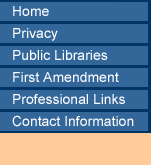
©2003 Trenton Times
re printed from:http://nj.com
Printer friendly version click here.
Privacy
is personal to her
Saturday,
July 26, 2003
By LINDA
STEIN
Grayson
Barber is a Princeton Township lawyer whose shingle should read,
"Privacy Matters."
Because
for her, it does. And because privacy has been her focus lately,
especially her contention that the federal government has opened
the door to invade personal freedoms.
Of particular concern, she said, is a new law that gives
agents an easy ticket to investigate everything from the library
books we read to the Internet sites we visit.

Barber,
who calls herself a privacy advocate for the residents of New
Jersey, believes U.S. Attorney General John Ashcroft and
Congress went too far when the USA Patriot Act was enacted just
weeks after the Sept. 11, 2001 terrorist attacks.
"I
believe this is unconstitutional," said Barber, 46. "My fear is
there's going to be a chilling effect."
While the
fight against terrorism may seem a worthy idea, Barber believes
the 342-page Patriot Act was hastily conceived, is too much of a
target for legal interpretation and a way for the government to
abuse our constitutional rights.
Her views
are shared by many - including an estimated 150 community
governments across the country that publicly have criticized the
law.
In May,
Alaska's Republican-dominated legislature passed a resolution
overwhelmingly opposing the Patriot Act. Legislators argue that
the law lowers the standards of privacy and gives agents too
much access to library records, bookstore purchases, personal
and school records and Internet accounts.
Barber
has advised the New Jersey Library Association about the
ramifications of the law.
In April,
the New Jersey group adopted a statement by the American Library
Association opposing the sweeping changes. It said the Patriot
Act and related measures "expand the authority of the federal
government to investigate citizens and non-citizens, to engage
in surveillance and to threaten civil rights and liberties
guaranteed under the U.S. Constitution and Bill of Rights."
While the
Patriot Act has captured national attention, local librarians
said it hasn't changed the way they do business.
"So far,
it has not affected us at all," said M.K. Kuriakose, director of
the Trenton Public Library. "We haven't warned the people (about
it). Nothing has come up."
Larry
McNamara, a supervising librarian with the Mercer County library
system, said records there are computerized.
"The
records are in the computer and once you return a book it
disappears," said McNamara. "And we don't know what book anyone
took out. We value confidentiality and that's one of the ways we
do it."
Before
passage of the act, the FBI or other police agencies needed to
obtain a search warrant if they had probable cause to
investigate a library user. The Patriot Act grants far greater
access to information to conduct surveillance, including the
gathering of e-mail and use of wiretaps as part of a foreign
intelligence investigation, said Barber.
"It
doesn't make us safer if they catch the wrong people," she said.
"It doesn't make us any safer to target people who had nothing
to do with the crime."
The
Justice Department disputes her assertion. Spokesman Jorge
Martinez called Barber's concerns "a lot of misinformation and
propaganda."
The
Patriot Act, he said, applies only to possible terrorists under
investigation and not to American citizens or lawful residents.
Agents must go to a judge under the Foreign Intelligence
Surveillance Act to get a warrant, he said, and its use in
investigations of "garden variety crimes and even domestic
terrorism is prohibited."
The law
gives federal agents the tools needed to "dismantle terrorist
cells before their deadly plans can be implemented," he said.
Barber
also is a member of the 13-person New Jersey Privacy Study
Commission, a group created to help refine the state Open Public
Records Act signed into law about a year ago. She has publicly
debated various aspects of that law on several occasions.
Barber
originally is from Los Angeles and studied law after obtaining a
master's degree in psychology and neuroscience at Princeton
University.
"I
studied monkeys," she said.
But after
differences with her doctoral adviser, she took a job in state
government in data analysis. She soon studied law in night
courses at Rutgers University.
Barber is
married to Peter Meyers, a
Princeton
University
physics professor, and they have a 6-year-old daughter.
Barber
believes there are two major trends since 9/11: an assault on
privacy and increased secrecy by the federal government.
Previously, government agents had problems "connecting the dots"
on terrorism, she said. "Now they'll have even more information
and will try to catch the bad guys by listening to the prayers
they say, monitoring the books they read and keeping an eye on
the political rallies they attend.
"So if
finding the terrorists is going to be like finding a needle in a
haystack, it doesn't help to make the haystack bigger."
For
example, she said, a high school senior without a home computer
may use a library computer to access information about a
militant Islam group for a school report.
Although
that activity is "clearly protected by the First Amendment," she
said, it could "trigger a search by the FBI."
And if
that student is an illegal immigrant, the FBI could turn him
into immigration authorities for deportation.
While
some librarians around the country have posted signs warning
patrons that their research might be revealed to law
enforcement, most in New Jersey have not, said Patricia Tumulty,
executive director of the New Jersey Library Association.
"Certainly, they're trying to make people aware," said Tumulty.
A state
law requires confidentiality for library users, so disclosure
would be required only with a subpoena or a court order. Under
the Patriot Act, librarians cannot contact the person who is
under surveillance or tell the press if a warrant or subpoena
was served.
Most
libraries in the state, including
Mercer
County's,
have self-purging systems that delete names once books are
returned, said Tumulty. However, computer hard drives might
still be searched for Web sites that a patron visited.
"There is
a Big Brother aspect," Tumulty said. "It's a thin line we
(librarians) walk with protecting people's rights."
Barber
volunteers for the American Civil Liberties Union, which tried
to obtain information about how often the government has used
the Patriot Act to obtain records from libraries. The ACLU was
turned away, Barber said, because the government considers the
information classified. A lawsuit has been filed.
Meanwhile
Congress may soon modify the Patriot Act. Rep. Bernie Sanders,
I-Vt., introduced the Freedom to Read Protection Act that now
has 75 cosponsors.
The bill
would exempt libraries and bookstores from the Patriot Act and
require law enforcement agents to return to more stringent rules
regarding probable cause before a search could be authorized.
Also it would remove the gag order now in place that prevents
librarians from mentioning a search, said Joel Barkin, a Sanders
spokesman.
An
amendment to the law couldn't come soon enough for Barber, who
wants her daughter to grow up in a world free of intrusion.
"In the
U.S., we believe in the marketplace of ideas and don't suppress
free expression," said Barber. "You want people to feel free to
go to the library. You let people read." |





